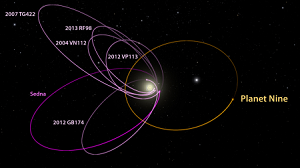
Through mathematical modeling and computer simulations, Caltech researchers have found evidence of a ninth planet—no, not Pluto—in our solar system.
“For the first time in over 150 years, there is solid evidence that the solar system’s planetary census is incomplete,” said Konstantin Batygin, one of the investigators on the project and an assistant professor of planetary science.
The so-called “Planet Nine,” though seen through modeling and simulations, has not yet been observed directly. The planet itself has a mass 10 times that of Earth and is 20 times farther from the sun than Neptune is. It takes 10,000-20,000 years for the planet to complete one full orbit around the sun.
Batygin and his co-investigator Mike Brown said Planet Nine helps explain the unusual orbits shared by several objects beyond the Kuiper Belt. What really provoked their attention was when simulations predicted that there would be Kuiper Belt objects in orbit aligned perpendicularly with other planets.
“We plotted up positions of those objects and their orbits and they matched the simulations exactly,” said Brown.
From where, exactly, did Planet Nine come? And how did it end up in our solar system? Scientists have long believed that four planetary cores clung to gases in their atmosphere to form four gaseous planets—Jupiter, Uranus, Saturn, and Neptune. Over time, collisions took them to their current locations.
“But there is no reason that there could not have been five cores, rather than four,” said Brown.
Planet Nine could have landed where it is, as far away as it is, if a fifth core got too close to one of its neighbors and was subsequently ejected into its strange orbit.
Batygin and Brown continue to study their simulations and learn more about Planet Nine’s irregular orbit and its influence on our solar system.
[Source:
caltech.edu/news
]

